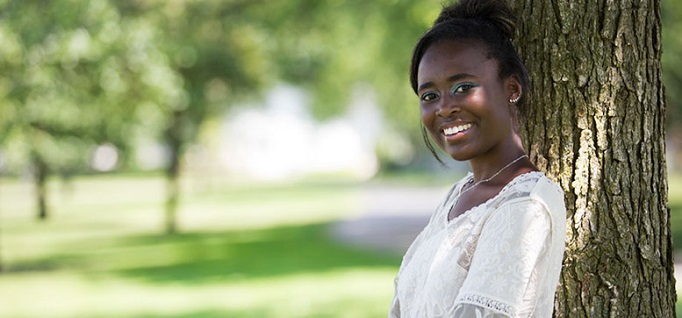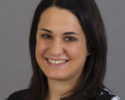Breaking through barriers
By Angie Mennecke
August 5, 2020
A community college engineering student overcomes inequities to excel in her studies and be a positive voice for change.
Driven by a passion for science and technology, College of DuPage (COD) engineering student Cierra Desmaratti is shattering the glass ceiling and pushing the envelope in science, technology, engineering and math (STEM).
In her third year at COD, Desmaratti is president of the Society of Women Engineers, a candidate for an internship at Argonne National Laboratory, and recently was given the honor of introducing Harvard physics professor, physicist and cosmologist Lisa Randall as part of COD’s STEMinar speaker series.
But the path leading to where she is today was not without its challenges. After graduating high school in 2017, Desmaratti felt lost with what she wanted to do next.
“I come from a poor family and the financial implications of a four-year college was overwhelming,” she said. “I didn’t know what I wanted to study, so taking out massive amounts of loans felt irresponsible. COD was the best option for me.”
Steered toward engineering
After expressing to a COD counselor that she excelled in math and science, her counselor recommended that Desmaratti look into the engineering program.
“I’ve always had an aptitude for math and science, but throughout my life, no one had ever considered that path for me,” she said. “As a Black woman, I had no personal role models or mentors to look up to in the science fields. I was surprised someone had recommended that path for me, but I jumped in head-first.”
The first two years were admittedly hard for Desmaratti. She was taking a full class load while working part-time to financially assist her family. It took a toll on her GPA and she ended up on academic probation. She also was disheartened to be one of the only females, and the only Black student, in her advanced math and science classes.
“There’s a tax, always thinking about how you’re different,” she said. “I’m not naïve to the fact that the cards are stacked against me as a Black woman. I know that, and yet I still felt blindsided when I saw it happening in real-time. I mistakenly didn’t seek out support from my professors or a counselor because I didn’t feel comfortable.”
Researching STEM inequities
In her spare time, Desmaratti researched the inequities in STEM and the data she found was jarring.
“I spent a lot of time collecting data to see if what I was experiencing in my classes was substantiated,” she said. “And everything I found confirmed that my experience was the norm. STEM has the highest presence of prejudices and stereotypes out of any college major and field. How was I supposed feel supported and accepted?”
Research from the National Science Foundation shows that women comprise 50 percent of the overall workforce but only represent 28 percent of the workforce in science and engineering. In addition, according to recent research from the National Center for Science and Engineering Statics, while more than a third of Black, Latinx and Native American students enter college with an interest in studying STEM, only 16 percent go on to obtain bachelor’s degrees in these fields.
Change agent
Disheartened by the statistics, the next year Desmaratti enrolled in classes with a new perspective — if she wanted change, she would have to be an active participant in her college experience. She looked for on-campus opportunities and found COD’s Society of Women Engineers.
“I worked really hard to rebuild my GPA and started to build my platform to stand out,” she said. “I became president of the Society of Women Engineers, and even though I didn’t know the first thing about being a leader, I knew I was eager for change.”
With a passion to make STEM a more inclusive and supportive environment for all ethnicities and genders, Desmaratti began an extensive research project, “Enriching the STEM System,” which focused on the driving factors behind the lack of women and underrepresented minorities in the field.
After an encouraging conversation with COD’s STEM Dean Jennifer Cumpston, Desmaratti was invited to present at the STEM divisional meeting, an experience Desmaratti called life changing.
“I had never been bold enough to go up in front of leaders and tell them how I felt as a minority female student,” she said. “I shared the microaggressions I face every day, and it made me realize that we need to hear more voices like mine. For the first time in a long time, I felt seen and I felt heard.”
After the presentation, Desmaratti had conversations with several science faculty members, including COD physics professor Tom Carter. She realized they had more common ground than she thought.
“Cierra’s discussion about inclusion, or better said, lack of inclusion, is an important one and she has solid data to back up her points both from her own personal research and from others,” Carter said. “I was so impressed that I asked to speak to her afterwards about her experience in the culture of my own classroom when she was my student. It was eye-opening. The conversation caused me to change the way I address inequities inside and outside of my classroom.”
Desmaratti is hopeful that with Cumpston’s leadership, COD will be pivotal in creating positive change.
This fall, Desmaratti will attend North Central College to study actuarial science. She is looking forward to continuing to use her voice for positive change.
There’s more to the story. Read the full article in CC Daily.



